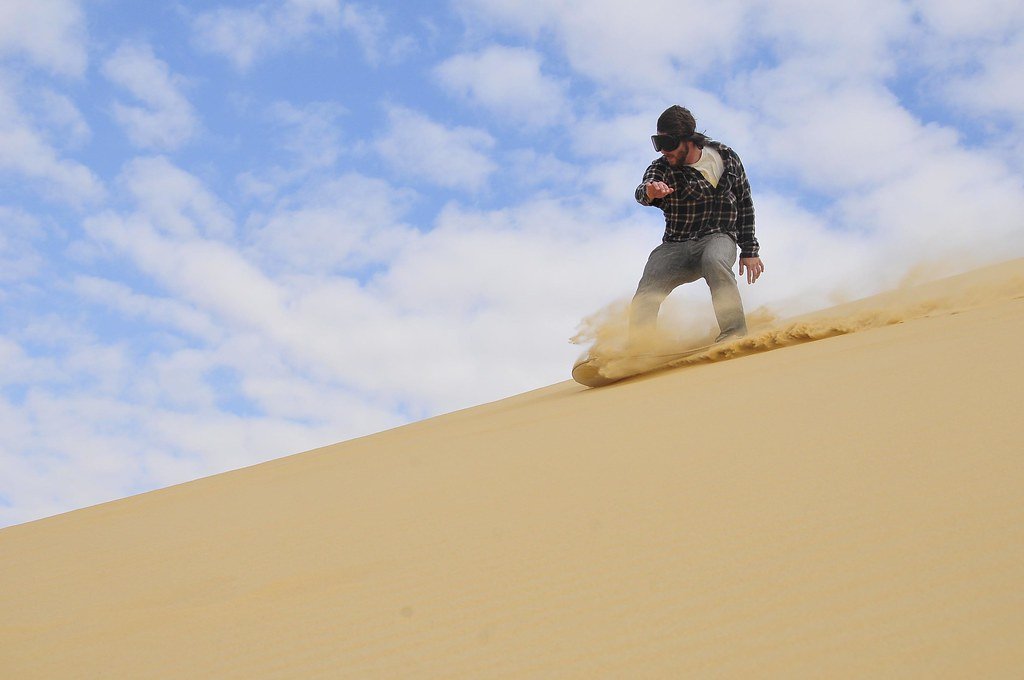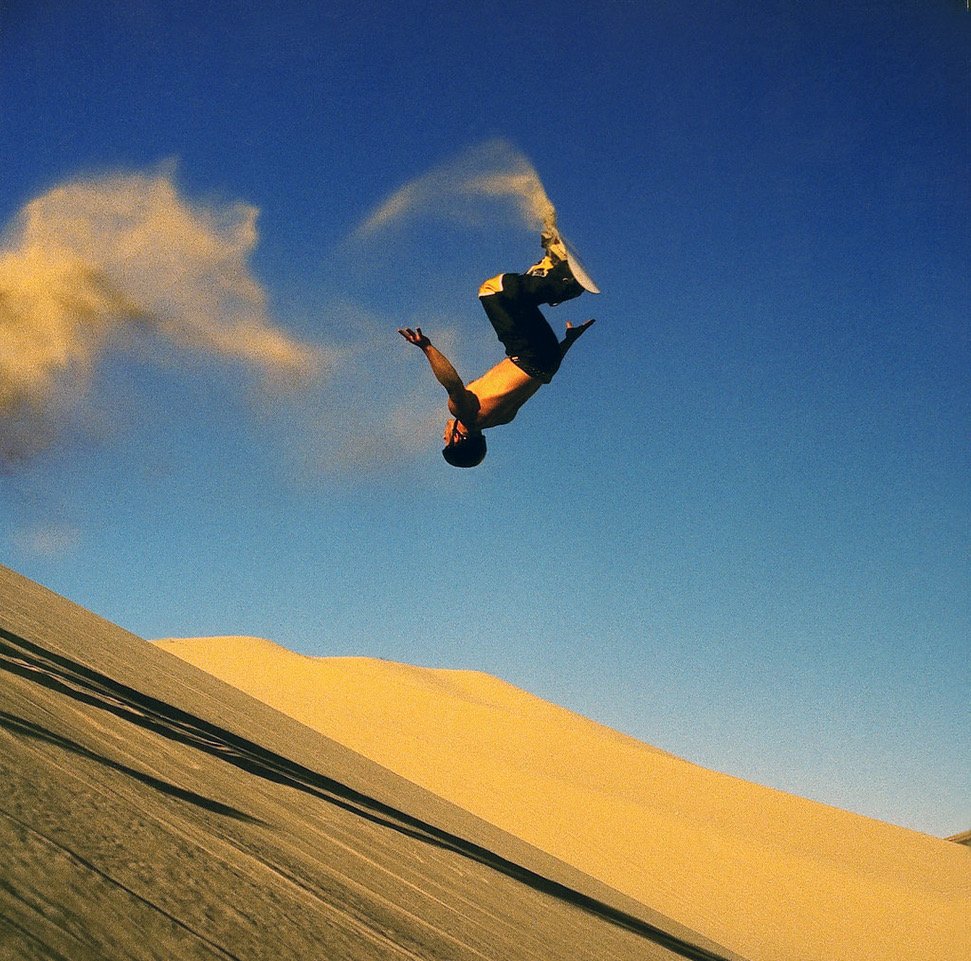Requiring nothing but a board and steady nerves, sandboarding has become a popular new solo-extreme sport. Small and large competitions occur all over the world as the sport gains popularity.
A man sandboarding in Egypt. Surfing The Nations. CC BY-NC-ND 2.0.
Sandboarding has gained popularity as an extreme solo sport, with competitions held at dunes around the world. The sport is perfect for adventurous athletes and travelers interested in seeing new places and seeking adrenaline-fueled fun, as it can be done anywhere with expansive sand dunes and the right equipment.
The sport itself is logistically simple: riders climb to the top of a sand dune and get on their board. Then, by jumping closer to the downward slope of the dune, pivoting to have their front foot ahead of them and leaning forward, the board will start to move and pick up speed as it makes its way down the slope—similar to snowboarding. Professionals will throw tricks like jumps and spins which have flooded YouTube over the years, and sandboarding courses have even installed bars and pipes for riders to test out, just like a skateboarder or snowboarder would find at parks or slopes.
Surfer Today describes sandboarding as “a blend between surfing, skateboarding and snowboarding.” Typically, sand boards are almost identical to snowboards, yet they tend to be lighter and either include no foot holdings or two straps for each of the rider’s feet with a latch that locks you to the board. No uniform is required unless you are competing professionally, and even then, experts and riders wear casual uniforms during competitions.
Pro-sandboarder Josh Tenge at Sand Master Park. OCVA. CC BY-ND 2.0.
Sandboarding is also an accessible sport that can be done on a range of levels from beginner to expert. At the beginner and intermediate levels, the extreme sport becomes more of a daring passtime. Perfect for summer conditions due to the dryness of the sand, recreational sandboarding is done all around the United States and in other parts of the globe. In the United States, perfect sandboarding conditions can be found in places like Utah’s Coral Pink Sand Dunes Park, Sand Master Park in Oregon, Monahans Sandhills State Park in Texas and the Kelso Dunes in California. There are more great national parks and dunes spread across the United States that perfectly cater to sandboarding conditions, and finding a location nearest to you can be easily done with a simple search on the internet; lists on the best locations to sandboard are scattered across the web because of how popular the activity is.
Additionally, there are amazing places to sandboard across the globe that are perfect for a day trip to some of the world’s most famous dunes and deserts. South America is immensely popular for sandboarding—the World Cup is typically hosted here because of the massive dunes and numerous locations to be found in the continent. Some examples can be found in Peru, at both Cerro Blanco and Huacachina, while other South American spots ideal for the sport are located in Concon, Chile. Towards the Middle East and Africa, other famous deserts and dunes that are great for sandboarding include the Great Sand Sea in Egypt, the Namib Desert in South Africa and the Moroccan Sahara, known for its vast expanse of sandy hills.
The Great Sand Sea in Egypt. Virtualwayfarer. CC BY-NC 2.0.
Most parks do not make visitors pay to use the sand dunes, but occasionally visitors will have to pay an entrance fee—especially if the dunes they wish to ride are located in a national park. If participants wish to take lessons, the prices of those are somewhere between $50 for an individual lesson and $160 for a group lesson with six people that lasts for a few hours at the Sand Master Park in Oregon and may fluctuate depending on where in the world you are trying to board. Rentals are also available at certain locations, like Sand Master Park, and boards costing around $10 to rent for 24 hours. Additional costs can be applied if users wish to rent helmets and other protective gear.
Many people find that the sport just takes practice. The beauty of sandboarding is that it is less risky to try as a beginner because the conditions are better for falling off your board or slipping on your way down the dunes when compared to icy conditions of snowboarding or the hard concrete used for skateboarding.
It is also worth noting that some places require participants to provide their own board; not all locations will have a shop where those looking to sandboard can rent the equipment. Boards for sale online range from anywhere between $150-400, but it depends on brand and size. Cheaper boards can be found on sites like Amazon for anywhere between $40 to $80 if people are not looking to invest in the sport too heavily.
Some slopes even end with a splash in a pond or lake; riders will descend dunes to find a ramp at the bottom which launches them into refreshing, cool water. This is exemplified in Huacachina, Peru, where the dunes feed right into a pond at the center of the village. Huacachina is also listed commonly as one of the best places to sandboard in the world and was the host of the Sandboarding World Cup in 2019.
Dune that feeds to water at Huacachina. Flexbox. CC BY 2.0.
More advanced riders who wish to compete at higher levels have a multitude of competitions to choose from around the globe. Alongside the Sandboarding World Cup, which changes locations frequently, other competitive events include Sand Spirit in Germany, the Pan-American Sandboarding Challenge in Brazil, the Sand Master Jam in Oregon and the Sand Sports Super Show in California. Participants compete for titles and merchandise, all fighting to become champions in this extreme sport.
Sandboarding is a great activity to get adrenaline pumping, explore new areas of the world, and to remain active during travel. . For those looking to ride the craziest, most intense dunes in the world, Peru, Egypt, Japan and a plethora of other locations provide not only a fulfilling trip but host the correct conditions for riding. Perfect for both adventure and travel, the sport encourages riders to seek the most daunting dunes in the world and conquer them.
Ava Mamary
Ava is an undergraduate student at the University of Illinois, double majoring in English and Communications. At school, she Web Writes about music for a student-run radio station. She is also an avid backpacker, which is where her passion for travel and the outdoors comes from. She is very passionate about social justice issues, specifically those involving women’s rights, and is excited to write content about social action across the globe.





